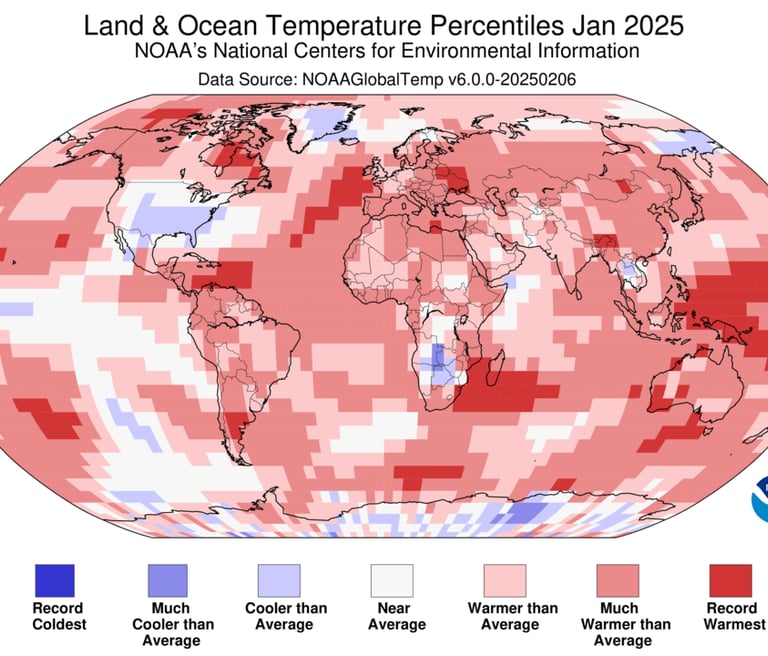January 2025 Breaks Heat Records—Climate Change and What We Can Do About It
Breaking heat records!!
In a striking reminder of our changing climate, January 2025 has gone down in history as the hottest January ever recorded globally. According to the World Meteorological Organization (WMO), average global temperatures were 1.75°C above pre-industrial levels, despite the presence of a La Niña event—a natural climate pattern that typically cools global temperatures.
This milestone isn’t just another data point. It’s the 18th month out of the last 19 that has exceeded the critical 1.5°C warming threshold outlined in the Paris Agreement. Even more alarming is that this surge happened while the Earth should have been cooling slightly due to La Niña. It highlights a sobering truth: human-caused climate change is now overwhelming natural climate variability.
The Bigger Picture: What’s Driving the Heat?
This record-breaking heat stems from our continued reliance on fossil fuels. Burning coal, oil, and gas releases greenhouse gases—mainly carbon dioxide and methane—which trap heat in the atmosphere. These gases persist for decades, steadily raising global temperatures and driving extreme weather events.
The warming is also melting Arctic sea ice, disrupting ecosystems, and fueling wildfires and droughts around the world. Even areas like parts of the United States and Russia, which experienced cooler-than-average temperatures in January, aren’t immune to the long-term consequences.
What Can We Do? Turning Concern Into Action
While these numbers are daunting, the path forward is still within our control. Here are key actions we can take—both individually and collectively—to mitigate climate change:
🌍 1. Shift to Renewable Energy
Governments and industries must accelerate the transition from fossil fuels to renewables like wind, solar, and hydroelectric power. On a personal level, consider switching to a green energy provider or investing in solar panels if feasible.
🚶♀️ 2. Rethink Transportation
Cars are a major source of emissions. Walk, bike, or use public transportation when possible. If you're in the market for a new vehicle, consider electric or hybrid options.
🍽️ 3. Eat More Sustainably
The global food system contributes significantly to greenhouse gas emissions. Reducing meat consumption—especially beef—can have a major impact. Support local, organic, and low-waste food practices when you can.
♻️ 4. Reduce, Reuse, Recycle (and Refuse)
Being mindful of consumption goes a long way. Cut down on single-use plastics, recycle correctly, and embrace a minimalist mindset to reduce your carbon footprint.
🗳️ 5. Push for Policy Change
Perhaps the most powerful tool we have is our voice. Support leaders and policies that prioritize climate action. Participate in climate initiatives and stay informed about local environmental issues.
🌳 6. Support Nature-Based Solutions
Protecting and restoring forests, wetlands, and other ecosystems helps absorb carbon from the atmosphere. Support conservation efforts, and if possible, contribute to reforestation programs.
The record heat of January 2025 is more than a headline—it's a call to action. The climate crisis is no longer a distant threat; it’s unfolding around us in real time. But every degree of warming we prevent matters. The choices we make today can shape a safer, healthier, and more sustainable future for generations to come.
Published By - Anya Pal (Irvington High School)
January 10th 2025
*Picture is from NOAA/NCEI


Published By - Anya Pal
September 29th 2024
